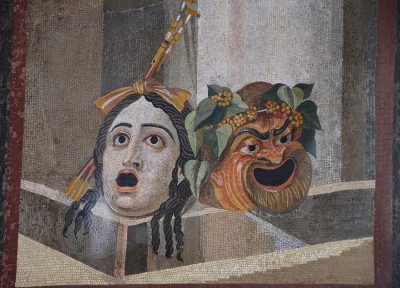From its first performances in ancient Roman times, actors in Plautus’ “Menaechmi” enjoyed the convenience of a physical stage, in a theatre with a live audience before them. But with today’s social distancing, students of Boston University’s “Roman Comedy in Translation” class have performed an adaptation of the play in an entirely virtual production.

The Department of Classical Studies and the Core Curriculum presented “Menaechmi” play — a script adapted by CL229 students and performed by faculty, graduate and undergraduates students in their own virtual window — Tuesday via Zoom, which was advertised as a “ridiculous evening of theater.”
The play was also preceded with a performance by the BU faculty-led band Fish Worship, who played a number of recorded performances, including a song from their new CD “Airport Blues.”
Sophie Klein, the Roman Comedy in Translation professor, described the play’s production as “an experiment to learn about Roman comedy from the inside out” — something she said worked surprisingly well.
“These ancient plays of Plautus actually take place in this sort of hybrid Greco-Roman world that is supposed to be very familiar to you and also have a sense of distance and foreignness,” Klein said. “We thought Zoom actually reflects that really nicely.”
The comedic plot centers around the mistaken identities of identical twins separated at birth. In the case of the adaptation, the characters are two BU students living on opposite ends of campus.
Following the mishaps and confusion of the two stranger twins’ entangled lives, the play pokes fun at BU’s campus life, Plautus’ own humor and even itself as its characters crack jokes and puns through the narrative.
The stock characters of the play were comically adjusted to modern standard — such as the parasite as a BU student who’s obsessed with the dining hall, the prostitute as the main character’s “side chick,” the person who is enslaved as an unpaid intern and the old man as a boomer.
Settings include BU locations such as a Terrier hockey game against Boston College.
Brian Ko, a sophomore in the College of Arts and Sciences and the parasite in the play, said performing on Zoom was a much different experience than in-person acting.
“I think that physical theater definitely has an edge up in terms of presenting a more engaging story so to speak,” Ko said.
Ko said, for instance, not being able to see the audience while on a Zoom call can be limiting to the performance, though he added that the online format took off some of the pressure and allowed them to relax, because “with your camera’s off, no one’s watching but yourself.”
The students performed without any rehearsal because “arguably that’s funnier,” as Klein put it.
Grace d’Eustachio, a junior in CAS and the “side chick” character, said the play was meant to be “less ‘polished performance,’ more ‘lean into the chaos of it.’”
“You don’t entirely know what’s coming, you just kind of read and go for it,” d’Eustachio said, “and it’s a comedy, so if it goes horribly wrong, that’s part of the joke.”
Kira Solovay, a student in CAS and the unpaid intern character, said she had no acting experience prior to this performance but found acting on Zoom more comfortable than in-person acting.
“I think I’d much rather be in the audience than on stage when it comes to acting in general,” she said.
Ko compared the adaptation of the play to the daily reality of living in a pandemic.
“If someone misses a line, you’re just going to have to adjust … so I think in some ways that kind of reflects COVID, because no one knows what’s going to happen,” he said. “It’s all about being flexible, maintaining that flexibility and keeping an eye and ear out just to see what changes and how to interact with it.”
Klein said though the Zoom platform is “very strange,” she sees it as an opportunity to create a unique adaptation reflecting the current time and the message of the original play.
“Now more than ever, this is an artifact of 2021,” Klein said. “Not just the jokes, not just the references, but the very medium itself is speaking to what we’re trying to do here.”

























































































































